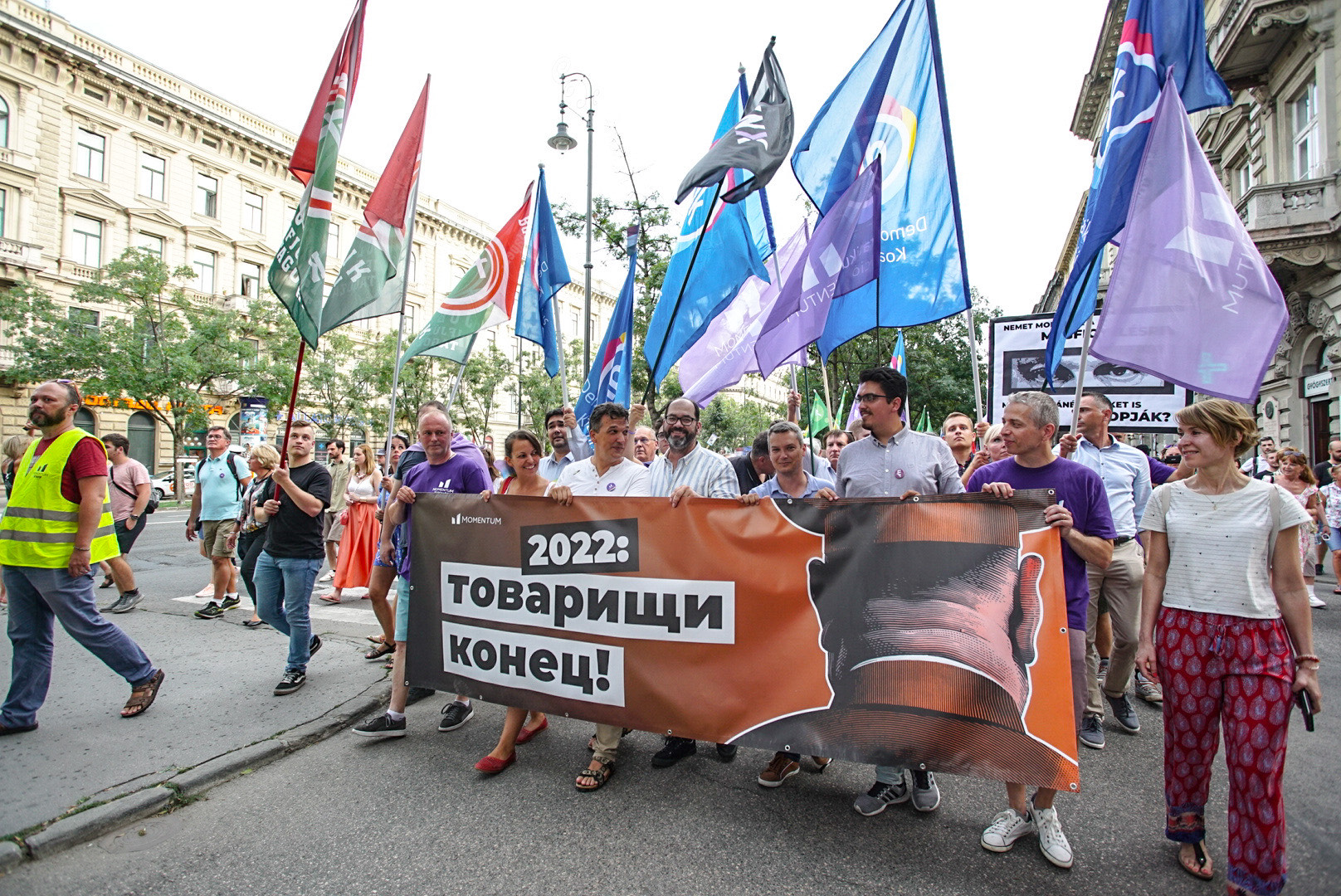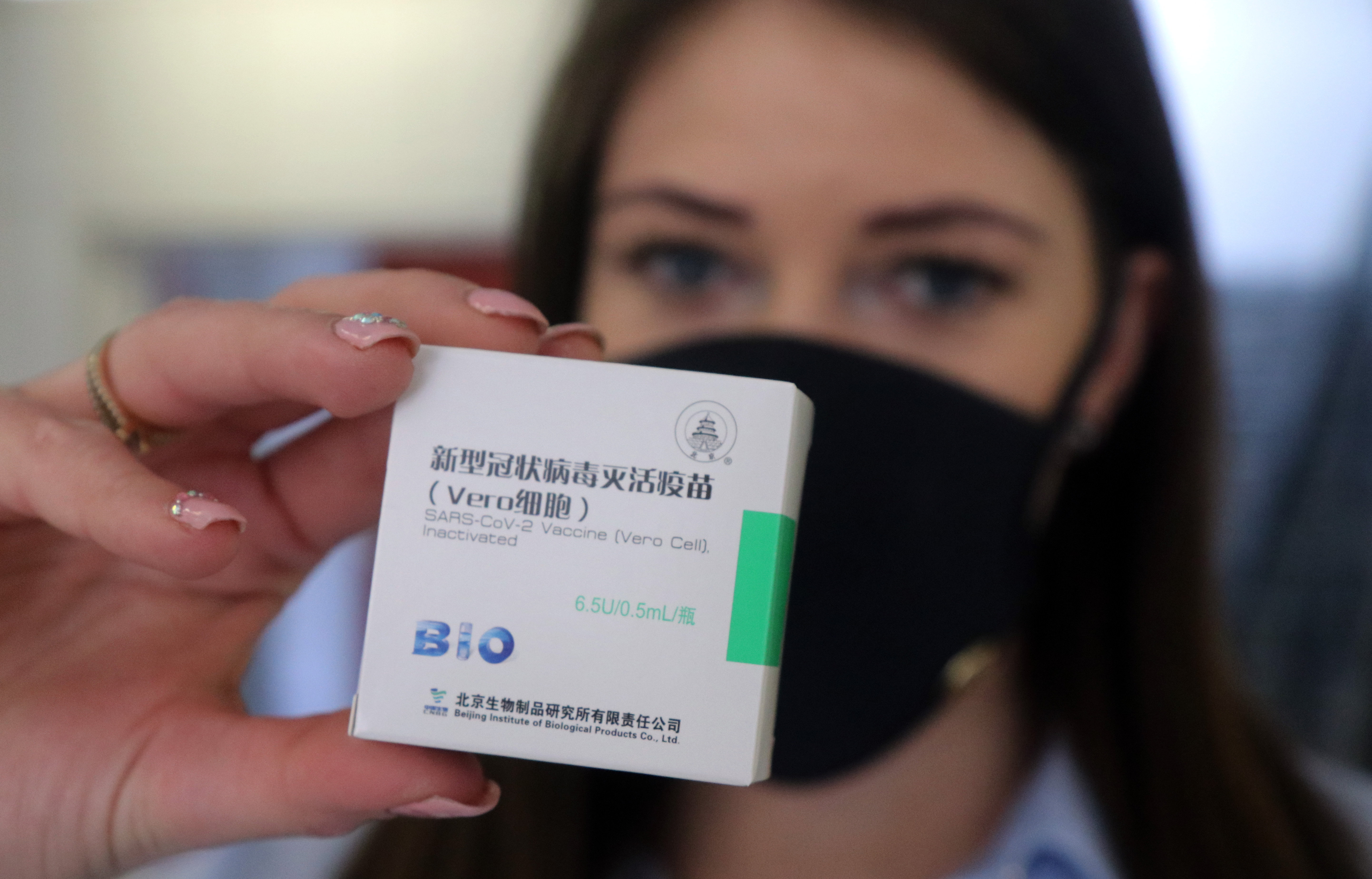Protesters call for government to resign over Pegasus spyware scandal
- Stay updated on the latest news from Hungary by signing up for the free InsightHungary newsletter:
Some 1,000 demonstrators gathered on Monday at Budapest's House of Terror museum to protest the government's alleged use of spyware to monitor critical journalists, businesspeople and politicians.
The protest, organized by several opposition political parties, brought supporters of Jobbik, Momentum, Dialogue, MSZP, Democratic Coalition, Everyone's Hungary Movement and the New Start party.
Many demonstrators and some organizers demanded the resignation of the government of Prime Minister Viktor Orbán over the spying scandal, which was revealed nearly two weeks ago through an investigation by an international media consortium led by Paris-based press organization Forbidden Stories.
Hungarian officials have refused to confirm or deny whether the government purchased or used the Pegasus spyware, produced by Israel-based firm NSO Group, but have insisted that all covert surveillance activities in Hungary are done in accordance with the law.
The investigation found that individuals had been targeted for spying in Hungary, Pakistan, Saudi Arabia, Mexico, Azerbaijan, India, France, and other countries.
Forensic analysis of several mobile devices in Hungary found that Pegasus had been used to break into the smartphones of at least five journalists, including those of Szabolcs Panyi and András Szabó of investigative reporting outfit Direkt36, which participated in the investigation.
In announcing Monday's demonstration, Momentum chairman András Fekete-Győr called the Pegasus spying scandal "the darkest case of the last ten years, which must cause the government to fall."
In an interview with The Guardian, Budapest Mayor Gergely Karácsony called for the resignation of Justice Minister Judit Varga, who, according to Hungarian law, may sign off on secret surveillance without judicial oversight.
Earlier on Monday, Fidesz delegates on parliament's national security committee boycotted an emergency session called by the committee's opposition members, preventing an official inquiry into the case.
Committee chairman János Stummer of the right-wing Jobbik party told 444.hu that the opposition members of the committee would conduct in investigation into earlier procurement requests brought before the commission to determine whether the government had purchased the Pegasus software.
But the key question, Stummer said, is not whether the spyware was purchased, but if it was used to spy on Hungarians on a political basis. He has called the national security committee to convene on the first day of the autumn parliamentary session, he said, when the Fidesz delegates will not be able to prevent a quorum.
Arriving to a cabinet meeting on Wednesday, Interior Minister Sándor Pintér was questioned about the Pegasus case by commercial broadcaster RTL Klub. Pintér said he could only speak about the matter to the national security committee, and that doing otherwise would violate the law against revealing state secrets.
Pintér warned that the RTL Klub reporter could face legal consequences for asking the minister to reveal such secrets.
Amateur programmer targets "national consultation" page with simple algorithm, government files criminal complaint
Hungary's government announced on Monday that it would launch a criminal complaint over an "IT attack" against its official national consultation website.
The announcement came after 444.hu first reported that a YouTube user uploaded a video showing a program automatically filling out the online questionnaire, which was also sent in paper form to every adult in Hungary.
According to the designer of the program, Gergely Tomanovics, the purpose of the action was "exclusively to demonstrate the standard of the governing party's IT capabilities." His program filled out more than 3,100 questionnaires with randomized answers in 12 hours using randomly generated names and email addresses.

National consultations, a form of informal survey regularly used as a campaign tool by the government of Prime Minister Viktor Orbán, have been heavily criticized for containing leading questions with the only rational answers being those that support the government's point of view.
The methodology for tallying responses to the consultation questions is not made public, and critics have argued the online version of the questionnaire can be easily abused, as demonstrated by Tomanovics's action this week.
During the last national consultation in September, a similar video was uploaded to YouTube showing a program automatically filling out some 10,000 questionnaires. The designer of the program, who described himself as a Budapest resident around 40 years old, told Telex.hu that he was an amateur hobby programmer, and that only the most basic programming knowledge was necessary to create the bot.
The creator of that bot was charged with a crime by the cybercrime division of the National Bureau of Investigations in May.
Hungary gets two month extension to address recovery plan concerns
The European Commission has granted Hungary a two month extension to address problems with its EU pandemic recovery plan, further delaying payment of the billions in recovery funds, Commission spokesperson Veerle Nuyts said on Tuesday.
The extension came after the Commission earlier indicated that Hungary's plan to use the HUF 2.5 trillion (~ €7 billion) recovery package failed to satisfy the Commission's requirements related to anti-corruption and judicial reform. The Commission delayed payment of the funds and called on Hungary to make the required changes to its plan.
Prime Minister Viktor Orbán reacted to the delay by arguing that the Commission was using the recovery package to wage a political attack on Hungary over recent legislation barring the depiction of homosexuality to minors that many critics in the EU described as an assault on LGBT rights. (The Commission has emphasized that holding up the recovery package is only related to anti-corruption and judicial independence.)
On Friday, the government articulated its viewpoint in an official decree, saying it would only accept an agreement on a recovery plan that does not include requirements placed on Hungary that do not apply to other member states.
However, Commission spokesperson Nuyts said on Tuesday that Hungary's government had demonstrated that it was open to working constructively with the Commission to resolve problems with the plan.
The deadline for completing negotiations on the recovery plan is September 30.
Third vaccine doses available from Sunday
Third doses of Covid-19 vaccines will be offered to some people in Hungary beginning on Sunday, targeted first at the elderly and those with chronic conditions and the immunocompromised.
The booster doses will be made available to those who had received a second vaccine dose at least four months prior. Registration for the booster may be done online or through general practitioners.
On Tuesday, chief medical officer Cecília Müller said that those who received their first two doses with a virus vector vaccine, like Sputnik, should receive an inactivated virus or mRNA vaccine for their booster dose and vice versa to provide the highest level of increased protection.
The National Healthcare Center recommended the following combinations of vaccines:
- AstraZeneca: Pfizer, Moderna and Sinopharm
- Janssen: Pfizer, Moderna, Sinopharm
- Moderna: Sinopharm, Janssen, AstraZeneca
- Pfizer: Sinopharm, Janssen, AstraZeneca
- Sinopharm: Pfizer, Moderna, AstraZeneca, Janssen
- Sputnik-V: Pfizer, Moderna, Sinopharm
The government's decision to allow third vaccine doses came after significant pressure to address concerns that some elderly recipients of the Chinese Sinopharm vaccine do not develop adequate antibodies after receiving a second dose.
The city of Budapest conducted free antibody testing on some 20,000 residents, and in the non-representative results it released, found that Sinopharm showed the weakest antibody response in elderly people among all of the six jabs used in Hungary.
A study released last week also showed that a quarter of people over the age of 60 and half of people over 80 did not develop adequate antibodies after receiving two Sinopharm doses.



